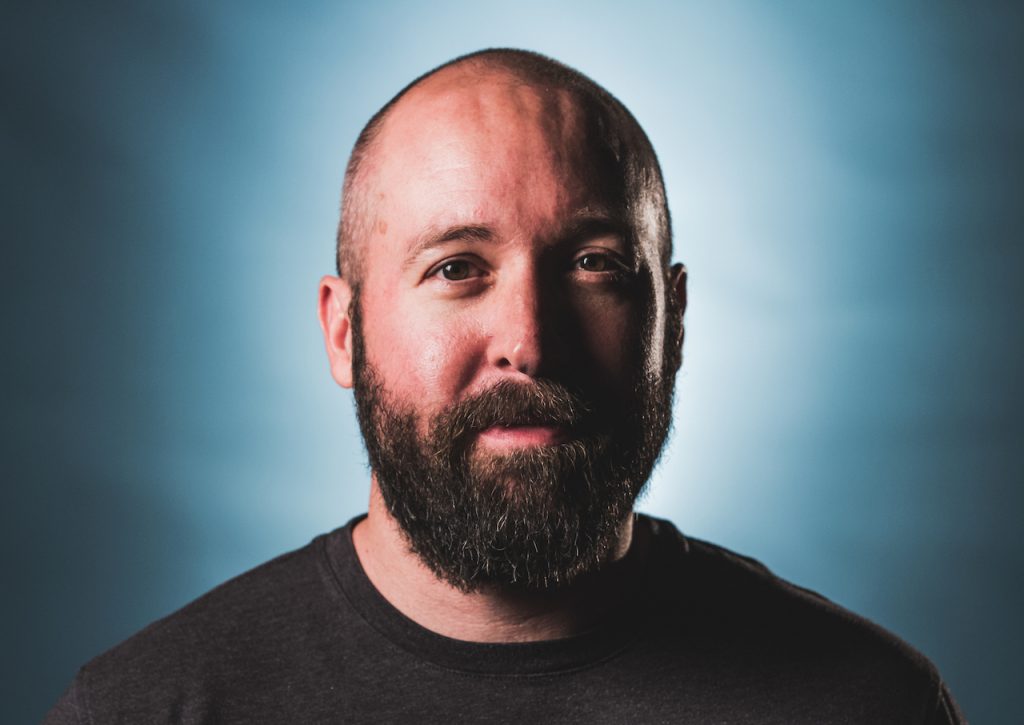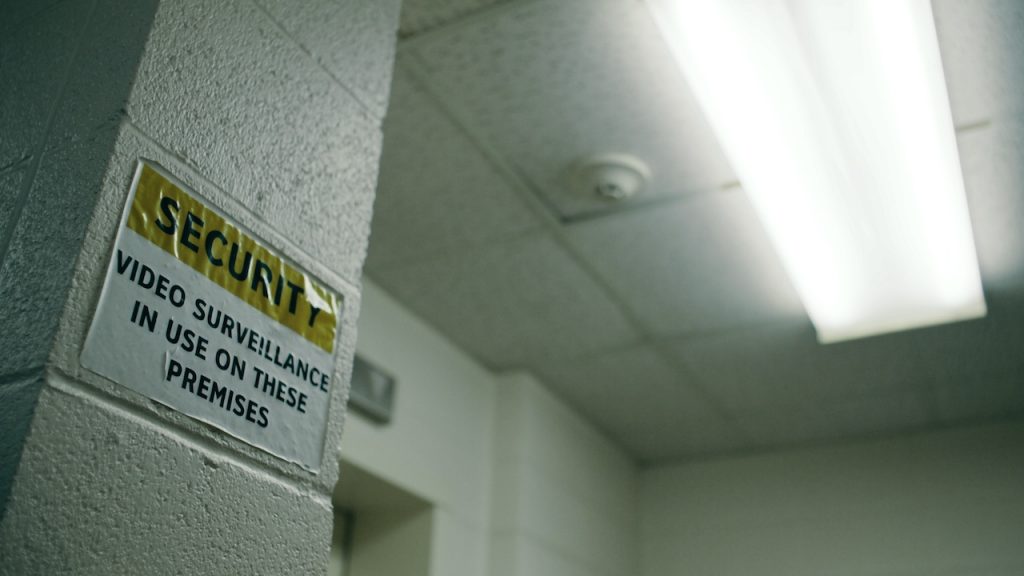According to Alfred Hitchcock, we all enjoy putting our toe in the cold water of fear. He wasn’t wrong. As Halloween approaches, we are reminded of our dark fascination with horror… and when the stories behind the entertainment are true, it’s all the more terrifying.
Texas Chainsaw Massacre. The Silence of the Lambs. Deranged. All took their inspiration from Ed Gein, whose crimes continue to elicit shock and disgust decades after they took place in a small middle American town. The first film to borrow from the real-life horror, however, was Hitchcock’s Psycho.
Filmmaker James Buddy Day (Catching a Serial Killer: Bruce McArthur, Blumhouse’s Compendium of Horror) takes a new look at the case in light of audio recordings that have recently surfaced, and examines the connection between the true story and the classic film in his latest docuseries Psycho: The Lost Tapes of Ed Gein. We spoke about the series and his career to date studying serial killers… and about our fascination with true crime and horror.
Tell me about the origins of the project and why you wanted to helm it.
There are tapes of interviews with Ed Gein that were recorded in 1957, by Judge Boyd Clark. He immediately put them in his home office and they made their way into a safety deposit box. Years after his death, the family revisited them and said, “This is a piece of history. We’ve got to get it out there somehow.” They still live in the area and contacted a mutual friend of mine who’s also a producer, Josh Kunau. Josh and his business partner, Jill Howerton, have a company called Roots Productions. They reached out to me through another mutual friend and the rest is history. We all knew that this is incredible. This is historical. This is a window into a lost time in America. And we got to do something special with it.

James Buddy Day
What do the lost tapes bring to the story, and how do they change it in your opinion?
I think that anytime you have a person, whether it be someone like Ted Bundy, Charles Manson, John Wayne Gacy or Ed Gein… any of these infamous killers… they become characters of themselves. I did a lot of work with the Manson family, and I would ask questions like, “What’s your impression of the Quentin Tarantino movie?” They’re always bewildered by what people think of them. So, whenever you have an opportunity in true crime to really personify someone who’s become a caricature of themselves, I think it really gives you great insight. It personifies them in a way that you can’t otherwise see, so I’m always looking for projects like that. I think it’s really interesting.
How do you approach research when you’re starting a new project?
I approach research very carefully and I take it very seriously. When we start a new project, I will spend weeks researching. I read every book I can get my hands on, I reach out to everyone that I can talk to. I have a small team I work with and we make spreadsheets of people we can talk to. One of the first things we do is start looking for archival material. We call news stations and we work with teams. We go through basements of news stations, ones that have beta tapes and 16mm film. And we just try to learn everything. I create a giant timeline of events. Our research process is very laborious and my goal is to know the story better than anyone. So, the research is intense, long and important.
What is your writing process like? What works for you and what do you find more challenging with this type of project?
My first step is to really just wrap my mind around the story. These are true stories, right? The events have really happened. So without any filter, I just try to wrap my brain around what happened. That usually involves creating a spreadsheet of the dates – when this happened and this happened and so on. I then look at what insight that gives me and make notes. It’s a really big spreadsheet at the beginning. Then what I do – and this takes me weeks – is I sit and write it all out in kind of a journalistic narrative. I just write it out on paper: Episode One, this is what’s going to happen, Episode Two, etc. Keeping in mind that this is a documentary, so there are lots of parts where who I talk to informs where that information is placed and what the next part is. I write that all out in a lot of detail and then and only then do we turn on a camera and start filming people. Once we film everyone, I go back and take that big outline and I rewrite it based on what we felt.
Looking at horror as a genre, how do the words “Based on True Events” up the game and add to the impact of a film?
I think the first movie to do that really successfully was Texas Chainsaw Massacre. I don’t know that it was the first movie to do it, but it was definitely the first movie to really lean in and use it as a marketing device on a national level. It allows the audience to put themselves into the story. If this really happened to someone, that means it could happen to you no matter how outlandish, horrific, bizarre or crazy it is. If you know that this is based on some version of reality, it enables the audience to really accept the story and empathize with the characters on a deeper level.

Waushara County Courthouse
Tell me about the connection between Ed Gein and Psycho.
I knew it going in… but what I think is really interesting in terms of the horror of it is that Psycho is the first “monster in plain sight” movie. The beats of Psycho are very similar to every slasher movie that’s ever come after. So, it really begins a new kind of horror that leads to everything from Friday the 13th and Nightmare on Elm Street to ones like the Rob Zombie movies which incorporate more direct references. There isn’t another American movie before Psycho that’s based on a serial killer per se, in such a direct way. Even when it comes to movies that aren’t based on or inspired by serial killers, screenwriters can frequently borrow ideas from things that serial killers have done or from their histories. It’s very difficult to point to a contemporary horror movie that you can’t trace back to Psycho.
One of your interview subjects says, “I’ve always been curious, and that’s been my downfall”. We seem to have such a fascination with true crime, with horror. What are your thoughts on where that comes from?
I’m personally fascinated by it. I read Helter Skelter in high school and that was the end of it… or the beginning of it, I should say! I’ve always been fascinated with the dark facets of humanity and I want to know all the details. I want to know how far people push their humanity, and why? What are they thinking? What are they doing? I’m fascinated with the idea of psychopaths and that really is almost like a black box for us. There’s a lot of great science and research involved in describing a psychopath, what a psychopath is, and being able to identify one. But in terms of what a psychopath really is like, what’s going on inside someone, how a psychopath’s consciousness is different from someone else’s, is really a mystery for us. I just find it really fascinating. For years there was this notion that they’re just evil, but that doesn’t really explain it.
We have different responses to it as well. You bring the guys from Last Podcast on the Left into the series and they bring an element of humor to it. What has been your experience in treading the line between appropriate humor and what some may consider going too far?
I’ve always been fascinated with the macabre. And there’s this part of horror that is almost not scary on purpose, but it is macabre, right? Think of a movie like House of 1000 Corpses – when that movie was made, the horror genre wasn’t mainstream. So, it was really celebrating these horror tropes, and it is scary, but also not really. It’s not really scary in a conventional way. I’ve always been fascinated by those ways of seeing horror. I’ve spoken with many networks and pitched many different ideas around ways to do a true crime series that’s also kind of irreverent or has a sort of humor to it. I got shot down across the board. No one wants an irreverent true crimes series.
I’ve worked on shows and put humor into them and it’s taken out. My co-executive producer, Paige Boudreau, came to me and said, “You should really check out Last Podcast on the Left, I think they’re doing what we’ve been talking about.” Their show has proven that you can do horror, you can do true crime, in an irreverent way that isn’t offensive. In a way that is funny, but also gives you this next level insight. So we talked to them and said, “Hey, would you consider doing this?” and we were so lucky that MGM was up for it and the guys really loved it. So, I think it’s really different and it’s been something I’ve wanted to do for a long time. It works in this series and I hope that we’re onto something with it. It wouldn’t work for every story, especially more contemporary ones. But I think there are a lot of scary stories that you can explore with that tongue in cheek element.
You have studied a lot of serial killers in your work and done a tremendous amount of research over the course of your career. Is there anything that you’ve learned through these experiences that has really surprised you?
I have this kind of weird skill set where I can talk to people in prison. I know how it works. So when I’m taking on these projects, someone will come to me and ask if we can talk to a serial killer. I’ve discovered that every serial killer “has a guy”. So when you connect with them, you’ve always got to talk to that person. It’s always a man or a woman who they’ve come into contact with years after their crimes, who is generally convinced of their innocence. I find those people to be incredibly interesting. What people don’t understand is when serial killers go to prison, they get really bored. They have nothing to do and they build these weird little communities of their fans or friends or followers, whatever you want to call it… and getting to interact with those groups is always very interesting for me.

